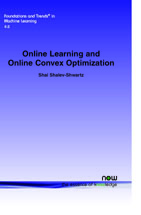Online Learning and Online Convex Optimization
By Shai Shalev-Shwartz, Benin School of Computer Science and Engineering, The Hebrew University of Jerusalem, Israel, shais@cs.huji.ac.il
Abstract
Online learning is a well established learning paradigm which has both theoretical and practical appeals. The goal of online learning is to make a sequence of accurate predictions given knowledge of the correct answer to previous prediction tasks and possibly additional available information. Online learning has been studied in several research fields including game theory, information theory, and machine learning. It also became of great interest to practitioners due the recent emergence of large scale applications such as online advertisement placement and online web ranking. In this survey we provide a modern overview of online learning. Our goal is to give the reader a sense of some of the interesting ideas and in particular to underscore the centrality of convexity in deriving efficient online learning algorithms. We do not mean to be comprehensive but rather to give a high-level, rigorous yet easy to follow, survey.
Online Learning and Online Convex Optimization
Online learning is a well established learning paradigm which has both theoretical and practical appeals. The goal of online learning is to make a sequence of accurate predictions given knowledge of the correct answer to previous prediction tasks and possibly additional available information. Online learning has been studied in several research fields including game theory, information theory, and machine learning. It also became of great interest to practitioners due the recent emergence of large scale applications such as online advertisement placement and online web ranking. Online Learning and Online Convex Optimization is a modern overview of online learning. Its aim is to provide the reader with a sense of some of the interesting ideas and in particular to underscore the centrality of convexity in deriving efficient online learning algorithms. It connects and relates new results on online convex optimization to classic results on online classification, thus providing a fresh modern perspective on some classic algorithms. It is not intended to be comprehensive but rather to give a high-level, rigorous, yet easy to follow survey of the topic.
